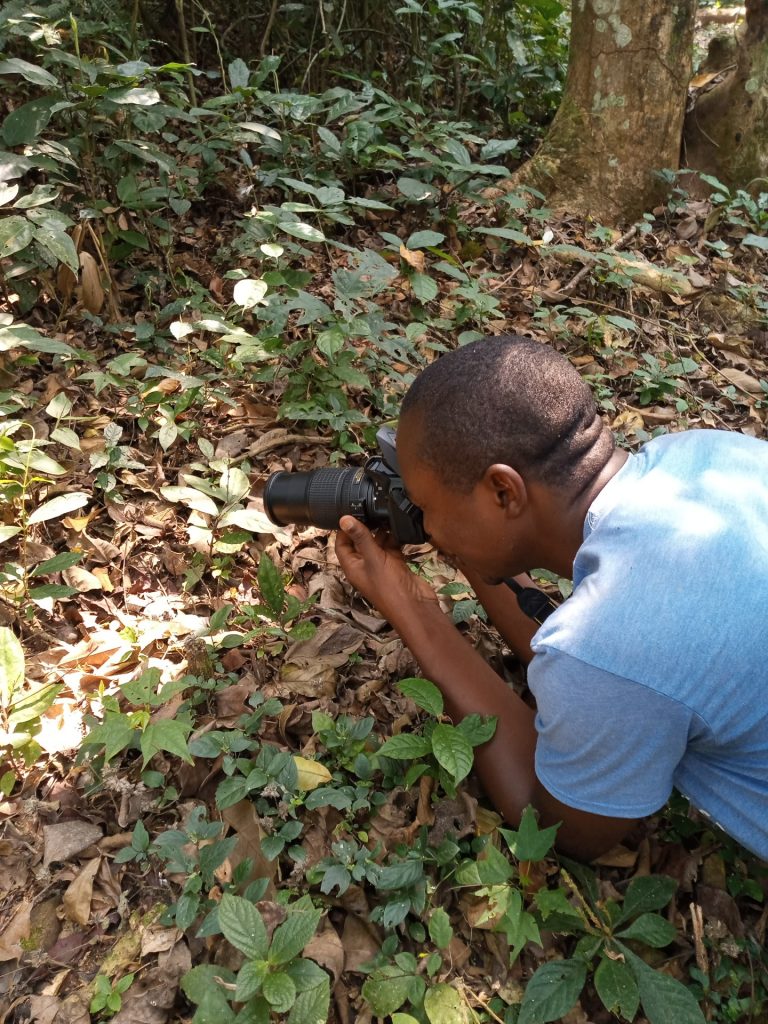Insects are part of the regular diet of an estimated billion people worldwide, and pollinators support billions more. Michel Dongmo is working to understand the impact that climate change will have on their populations globally and in his home country of Cameroon.
“I grew up with insects as part of my diet,” says Dongmo, an entomologist at the University of Hong Kong. Studying the way insects interact with their environments, the threats that they face and ways to conserve them is going to be increasingly important as global temperatures continue to rise. “This is what I’m trying to do in my research, especially in the tropics,” says Dongmo. “There is still a lot of research to be carried out.”
Growing up in the small city of Dschang in Cameroon’s Ouest (West) Province, Dongmo was fascinated by Africa’s large animals. After receiving his Bachelor of Science in Animal Biology from the University of Dschang in 2009, he turned his focus to the tiniest creatures on the continent. Moving to Yaoundé, the capital city of Cameroon, Dongmo pursued his master’s degree at the University of Yaoundé 1, investigating the impact of climate change on Africa’s tropical insects.
The invasive fruit fly Bactrocera dorsalis was one such species. Recorded for the first time on the African continent in 2003, Bactrocera spread rapidly, and is now present in at least 35 countries in sub-Saharan Africa.

Credit: Michel Dongmo
“It became the most important fruit pest in most African countries,” says Dongmo. “My master’s project was to try to understand what happened for the insect to become so quickly dominant over the continent. [The answer] was simple: the climate condition was so good, and there was a large range of suitable host plants – fruits and vegetables.”
The problem, says Dongmo, was that populations of native African insects that may have slowed the Bactrocera invasion were already compromised. “We think that is because of climate change, and its disruption of ecosystems – the disruption of interactions among insects. That was the cause of this huge colonization of Bactrocera all over the continent.”
Seeking resilience
With his master’s completed, Dongmo pursued his PhD at the University of Yaoundé 1 looking at how climate change was altering the morphological, behavioural and genetic features of insects – in particular, the Central African butterfly (Bicyclus Dorothea).
The caterpillars of the Central African butterfly are one of the most economically important edible insects in Cameroon, and are an excellent source of proteins and fats. Dongmo found that the butterflies that lived in forest-savanna ‘ecotones’ – transition areas between two different ecological systems or habitats – were more resilient to lab-induced heat stress than butterflies sourced from more discrete habitats, such as a rainforest, which tend to have fewer temperature fluctuations.
Having moved to Hong Kong following the completion of his PhD, Dongmo is looking at how the use of agricultural pesticides may interfere with interactions between insect species. The project, which is focused on rice production in Thailand, is investigating whether pesticides could weaken the resilience of some insects to the effects of climate change and disrupt their ability to keep other pest species’ numbers in check.
If the predator is more sensitive than the prey – the pest species – then this is going to be a very, very, big problem.
“It means the population of the pest can grow.”
Research where it’s needed
Dongmo says there is a much steeper hill to climb for researchers from the Global South to advance their academic careers, compared to many of their peers in wealthier nations.
Convincing grants councils that “good” research can be done in Global South countries, especially those with under-resourced facilities, is challenging, he says. This has led to a dearth of research being carried out in places like Cameroon, where Dongmo says he feels the pull to conduct his future climate work. “I’m lucky to have a job at the University of Hong Kong,” he says.
Most of my [academic] friends from back home are struggling.
As he focuses his research in Thailand, Dongmo admits to feeling some regret about not having an active project in Cameroon. “Maybe we can write another project [to carry out] in Cameroon, because there is still a lot of work to do there.”
Story by Nick Kilvert


Comments are closed.